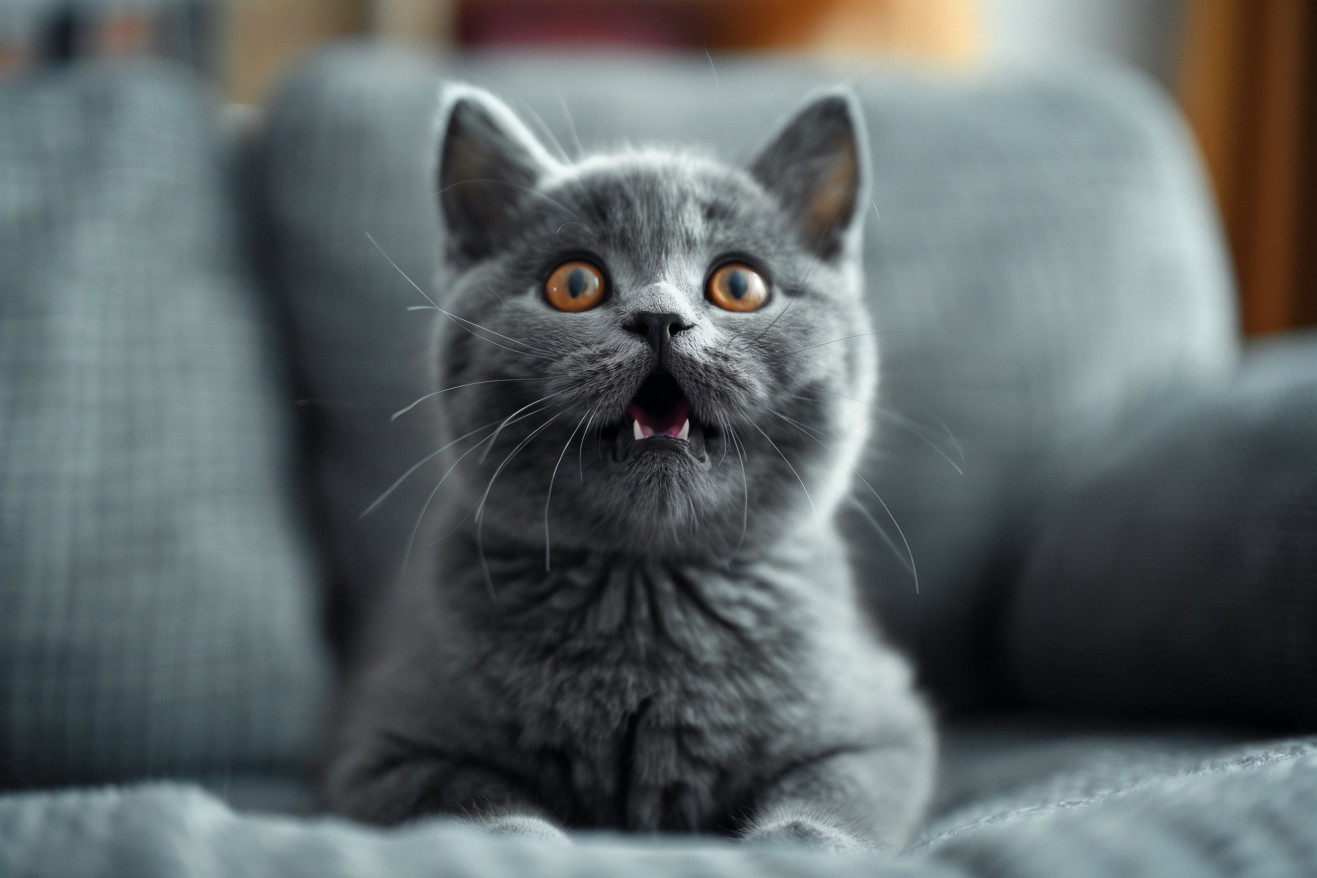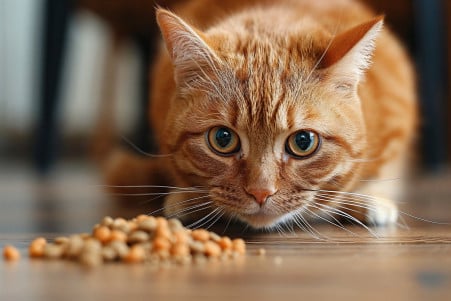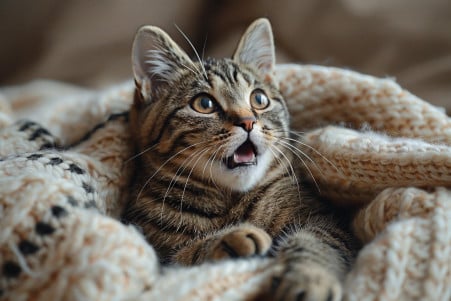Do Cats Burp? Decoding Feline Digestion and Health
22 February 2024 • Updated 21 February 2024

Even though humans burp all the time, you may still be wondering: do cats burp too? The answer is yes, but it’s not very common. Cats burp for the same reasons that humans do, including swallowing air, digestive issues, and hairballs. That said, if your cat is burping a lot, it could be a sign of a health problem like acid reflux or esophagitis, and you should see a vet.
To answer this question once and for all, we’ll look at veterinary and biological research to get a comprehensive understanding of the ins and outs of feline digestion. We’ll cover the anatomy and behaviors that make burping possible for cats and what it could mean if you notice your cat burping.
We’ll also talk about the impact of a cat’s diet and other factors on their digestion. Let’s get to the bottom of the question of whether or not cats can burp and what it means for our furry friends.
Do cats burp?
The Feline Digestive System and Its Impact on Burping
The feline digestive system is a highly complex system that includes the mouth, esophagus, stomach, intestines, and important accessory organs such as the liver and pancreas. It has evolved to perfectly suit the needs of these obligate carnivores.
FirstVet explains that the digestive process for cats begins in the mouth, where enzymes in the saliva start to break down the food, and continues as the food travels down the esophagus to the stomach for further digestion.
One important thing to note is the function of the esophageal sphincters. Cats.com explains that the upper and lower esophageal sphincters have very specific roles; the upper sphincter controls the passage of food and the release of gas from the stomach, and the lower sphincter prevents the contents of the stomach from coming back up.
This level of control could be a reason that burping is so rare in cats, as burping happens when the lower sphincter relaxes to let gas escape.
The strict dietary requirements of cats, which are high in protein and low in carbohydrates, also impact their digestive system. FirstVet suggests that this could lead to differences in gut motility and gas production when compared to omnivorous animals, which could impact the frequency of burping in cats.
The anatomical differences, especially in the structure of the feline esophageal sphincters and the dietary requirements of cats, likely contribute to the rarity of burping in cats. Knowing these details not only helps us understand how special our cats are, but it also helps us understand the nuances of their health and habits.
Why Do Cats Burp? Common Causes and More Serious Conditions
While cats don’t burp as frequently as humans, the reasons they do are often similar. For example, one of the most common causes of burping in cats is swallowing air, a condition known as aerophagia. This can happen if a cat eats too quickly or grooms itself too much, according to PetMD.
Gastrointestinal issues, like hairballs, can also cause burping by causing reverse peristalsis. Dietary issues can also be to blame; if a cat is eating a diet that doesn’t agree with them, it can cause gas, which can lead to burping.
More serious medical conditions, such as acid reflux or esophagitis, can also cause cats to burp more often. According to the Merck Veterinary Manual, these conditions can cause the digestive system to function abnormally, which can lead to symptoms like burping. How you feed your cat can also make a difference; for example, feeding your cat several small meals a day instead of one large one can help prevent aerophagia.
If your cat is burping often, it’s a good idea to take them to the vet. A professional can help determine the cause of chronic burping, especially if it’s accompanied by other digestive symptoms, and help you manage or treat any conditions that may be causing it. You should also keep an eye on your cat’s general well-being and talk to your vet if you notice any major changes in their digestion or behavior.
The Science of Cat Burps
While burping is a well-known and important physiological process in humans, it helps to relieve the stomach of excess gas by expelling it through the mouth—it is much less well understood in cats and is much less common.
A paper in Neurogastroenterology and Motility found that cats can perform a reflex similar to the human ‘supragastric belch’—a rapid inhalation followed by a belch—and that this reflex is mediated by the vagus nerves and esophageal receptors. This reflex is accentuated by esophageal acid exposure.
This paper also explained the anatomical and neurological processes that make burping possible in cats, including the role of the hiatal and dome fibers of the diaphragm in the different phases of the reflex. The paper also suggested that gastric pneumatosis, which is the presence of gas in the wall of the stomach, may be related to burping in cats, which means that other digestive issues could also affect this reflex.
A paper in PubMed also explains the mechanisms of gas release and transport in the cat gastrointestinal tract, which can help us understand how burping works in cats. These findings show the complexity of cat physiology and how it is similar to and different from other animals, and help us understand more about cat health and behavior.
Aerophagia and Burping in Cats
Aerophagia, or the swallowing of air, is a condition that affects both humans and animals, including cats. When air is swallowed unintentionally, it can lead to an accumulation of gas in the digestive system, which can cause burping. In cats, aerophagia can be caused by eating too quickly and the body positioning during grooming.
A study published in PMC highlights the importance of the coordination between the respiratory and digestive systems. When swallowing, the airway and the esophagus come together in the pharynx, and the coordination between the two systems is needed to prevent aspiration and ensure that food goes down the right way.
When this coordination is disrupted, as it is in cases of aerophagia, it can lead to an increase in the amount of air that’s swallowed.
A study by K Nakajima that was published on PubMed found that nasal obstruction can lead to an increase in the amount of gas in the gastrointestinal tracts of animals. The fact that there is a link between nasal obstruction and gas in the gastrointestinal system suggests that keeping the nasal passages clear is an important part of managing aerophagia in cats.
Aerophagia in cats is usually treated by addressing the underlying cause, which can include changing feeding habits to slow down eating or making sure that the nasal passages are clear. This, in combination with an understanding of your cat’s eating and breathing habits, can help prevent this condition and promote good digestive health.
Customizing Diet and Lifestyle for Your Cat’s Digestive Health
A cat’s diet is one of the most important factors in their digestive health and, therefore, in their likelihood of burping. As The Spruce Pets explains, cats have digestive systems that are similar to humans, so they can have gas, and that means that what they eat can affect how much gas they have and how often they burp.
While gas in cats can be a sign of a more serious issue, it can also be a sign that a cat’s diet needs to be adjusted. Feeding cats food that is wet or dry and that contains certain ingredients and avoiding changing their food too often can help lower the amount of gas and burping they experience.
The frequency and size of meals play a big role in a cat’s digestive health. Feeding cats a new diet that is lower in carbohydrates and has a different protein source can help reduce gas, as PetMD recommends. Introducing the new diet slowly is important to help cats adjust and may also mean that cats are less likely to burp.
Feeding cats at the same times every day and ensuring they get the right portion sizes will help ensure that their digestive systems stay on track.
A low-stress environment is also important for a cat’s digestive health and can help reduce the likelihood of burping. Regular exercise, play, and making sure that cats have comfortable places to sleep will help ensure that they stay calm and active and that they don’t experience stress that could affect their digestion.
These steps, combined with making sure that their diet is well-managed, can help ensure that cats are less likely to experience digestive issues and burping, which will make them happier and healthier pets.
Conclusion: The Mystery of Cat Burps
So, what have we learned in our investigation of cat burping? We’ve learned that while cats can burp, it’s a pretty rare occurrence. Since cats are obligate nasal breathers, they don’t take in a lot of extra air, which means there’s not much to burp up.
That said, when cats do burp, it can be a sign of a few different things, including a sensitive stomach, hairballs, or more serious issues like acid reflux or esophagitis. According to PetMD, cats that burp frequently may be suffering from inflammatory bowel disease or other gastrointestinal issues, so this symptom shouldn’t be ignored.
Knowing the ins and outs of your cat’s digestive system is important for their overall health. While burping may be a sign of something relatively harmless, it can also be a sign of a more serious issue. Cat owners should always be on the lookout for signs of digestive distress in their pets and consult a vet when they have concerns.
Being an attentive pet owner is important when it comes to your cat’s health because it means you can catch potential issues early. This, in turn, means you can get your cat the help they need more quickly. So, a little vigilance can go a long way.
When combined with a little knowledge, this can help ensure your cat lives a long, happy, and healthy life. And with that, our exploration of the mysterious world of cat burping concludes.
But it’s a good reminder that sometimes even the smallest things, like a rare burp, can tell us a lot.


